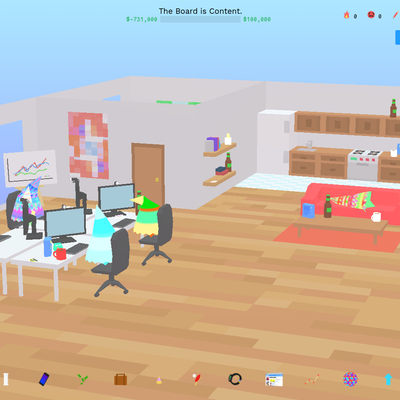
It was around the time I fired all of my employees — including my co-founder and people who had been with me since day one — and replaced them all with robots that I realized running my once-scrappy, now-multi-billion-dollar tech company “KORN The Company Not The Band” had taken me to a pretty dark place. But I was deep into playing Francis Tseng’s The Founder, “a dystopian business-simulator.” I had already done plenty I was ashamed of. And getting rid of my human employees just made sense.
“I lived in the Bay Area around San Francisco, around all the start-up culture, and I felt like there is a lot I wanted to point out about it,” says game creator Francis Tseng. Tseng grew up outside of Philadelphia, studied cognitive neuroscience, worked for a start-up in Beijing, and then IDEO in San Francisco, before settling in as a researcher at New Inc. The aim of the game, he says, was to put people in the self-sustaining systems of a typical tech company, and then let their own pursuit of profit, expansion, and need to please the board lead them down the garden path to Thielian and/or Muskovian levels of megalomania. “Games are usually a good way to put people in the position of having to make decisions on their own,” says Tseng.
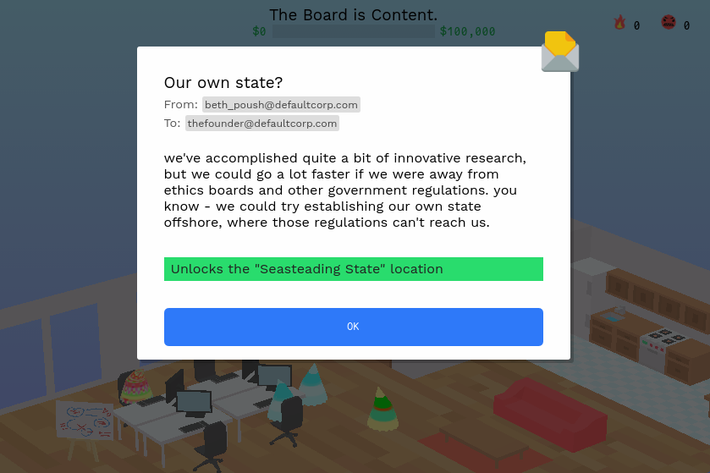
The Founder is the latest game to have player agency work as a form of social commentary. In 2013 game Papers, Please, you play as a faceless bureaucrat in an Eastern Bloc state allowing or denying people entry into the country — which slowly makes you complicit in randomly enforcing random rules in order to keep your family fed. This War of Mine places you in the role of a refugee in something like the siege of Sarajevo, starving and cold and desperate, and can take you to some truly dark places as you struggle to survive. It’s even present in some AAA titles; BioShock is essentially a critique of Ayn Rand’s work, while Spec Ops: The Line is a Heart of Darkness homage that forces players to consider the emotional impact of shooting hundreds of people over the course of a few hours.
In The Founder, you start out as a tiny start-up, working out of your apartment, gradually expanding to a Google-ish-type campus. Tseng says he took a lot of the game’s bright and twee art cues from Google’s offices. “It’s very colorful and childlike,” he says. “But you also have this very childlike perspective on the world.” At first, it’s you, a co-founder, and a couple of low-paid employees. You bring in employees by spouting pablum (e.g., “You’ll have a huge impact on people’s lives”). After that, you aggressively negotiate down their salary until you find a couple of people willing to work for just above minimum wage to get the chance to build products for your company. In my case, it was running a social network and selling a few ads — the best years.
The core loop of the game, in the early days, is tremendously fun. You launch products on the market and then play a hex-based tactical game to gain market share. It’s a sort of chess-based approach to winning over consumers to your side, which boosts your overall revenue gained from a product. The number of pieces you can place on the board, how “strong” they are (i.e., how many times they can take a hit from an opponent’s piece), and movement speed are all determined by your core product team. To get better at gaining market share you need better employees, so you head to job fairs or ask recruiters to find you employees with higher skill ratings. It’s the type of side game I could play as just a real game, and my early hours of The Founder were spent mainly battling it out for market share and trying to find anyone with good design or marketing capabilities.
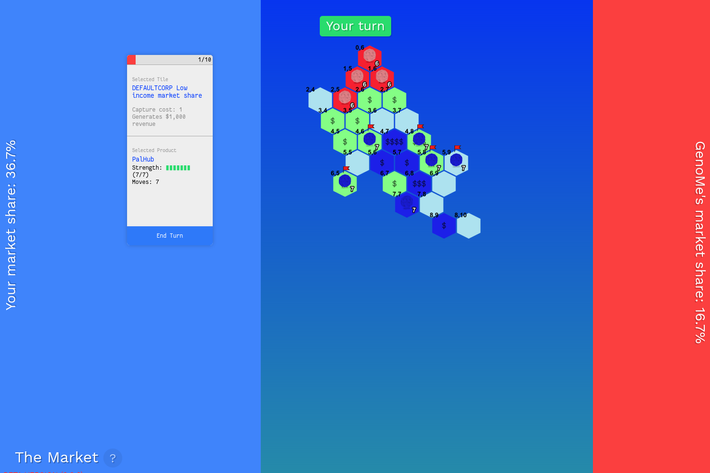
There’s a reason I enjoyed this early game so much. Tseng meant for it to be the warm bath you ease into before the water starts boiling. “I wanted the game to present itself in a familiar way, with start-up rhetoric and buzzwords,” he says. My first few hours with The Founder were spent questioning whether this was really a “dystopian” simulator. Sure, riding people hard on salary wasn’t great. But otherwise, I was just launching a new version of Facebook, and that was okay, right?
“The idea was that gradually, over time, the true face of the game would reveal itself and sort of catch people off guard,” says Tseng. “They’d get to the point where they’re making all these decisions, and at some point, they have a sudden realization: ‘All this stuff I’m doing is really shitty. I don’t even know if I really want to do this game.’”
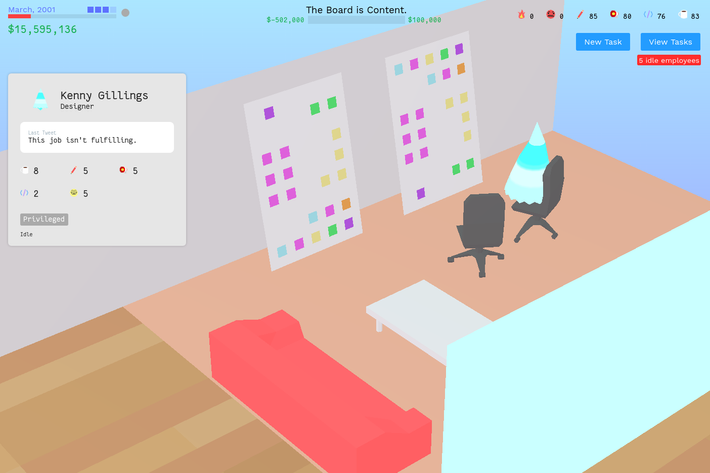
As my company expanded, things started to get darker. I wasn’t just paying people the lowest wage possible: I had spent tens of millions of dollars lobbying the government to lower wages, gain DARPA contracts, and give “KORN The Company Not The Band” tax breaks. I had covered up countless sexual-harassment scandals, factory-worker suicides, and some unfortunate breakdowns in biomedical lab protocol. My employees, caught in constant product cycles, were burning out — no matter how many office dogs or in-house therapists I threw at them.
And, realizing where the best return on investment was, my main two products that I relentlessly pushed on to the market were a space weapon known only as “Zeus” and a genetically engineered synthetic soldier dubbed “DNArmy” — far, far away from my humble beginnings as a Facebook ripoff.
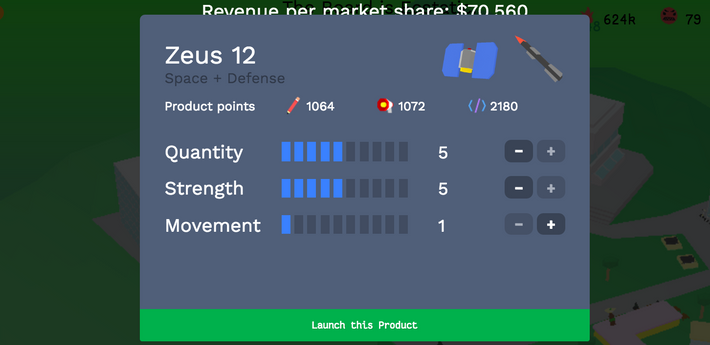
I was raking in cash — about $90 billion a year — but it wasn’t quite enough. You see, I’d been working on all sorts of special projects: creating a seasteading community where no government “regulations” could protect my workers from their own genius, learning how to clone my best employees, and making myself immortal. (Sadly, that project did not involve harvesting the blood of the young.) But I needed nearly a trillion dollars of on-hand cash to complete my final project: creating an AI in my own image. And one of the biggest drains on my profits? Salaries.
So instead of paying my programmers and designers and MBAs six-digit salaries every year, I just paid $500,000 once for robotic workers that were better, didn’t ask for any annual salary or pay raises, and didn’t suffer from burnout. The choice, like all the others I had made before it, just made sense. But as my robots wandered my campus, utterly indifferent to the in-house gyms and gourmet catering I made for my former human employees, I wondered: Could I have done it differently? Is there an ethical way to play The Founder?
“There are small things you can do to make you less terrible,” says Tseng. “But you ultimately end up in morally compromising positions no matter what. The only way to play ethically is to stop at some point. Like, ‘Okay, I’m big enough and I’m making enough money.’”
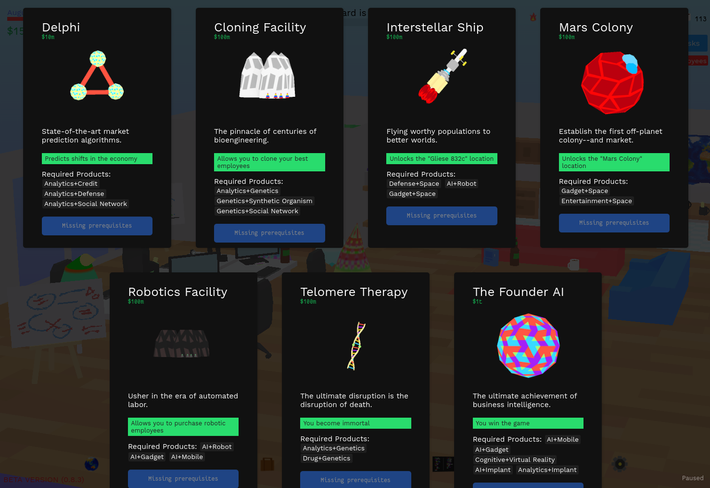
I did not reach that state of enlightenment. Producing an AI version of myself consumed everything. The game itself had become a grind. To make the amount of money I needed, I no longer was playing the fun hex-based chess games to win market share, just assigning an employee to play it for me to save time. I had four teams of robots producing endless variations on defense tech, another robot team putting on constant music festivals sponsored by “KORN The Company Not The Band” to boost brand recognition and therefore revenue, and had my international offices stepping in if there was anything that would impact my bottom line. I was mainly clicking “okay” over and over.
Then, finally, I hit my goal and gathered up enough cash to make an AI reproduction of myself. I was living Ray Kurzweil’s dream — I had reached the Singularity. I threw my entire company into researching the tech. It took less than a month. The AI came online.
Then the AI version of me promptly fired the human version of me. I was, after all, decaying meat: taking up space, sucking up air and oxygen and food and water and shares and board seats and everything else our inefficient human bodies need. “KORN The Company Not The Band” would do better without me. It just made sense.





























